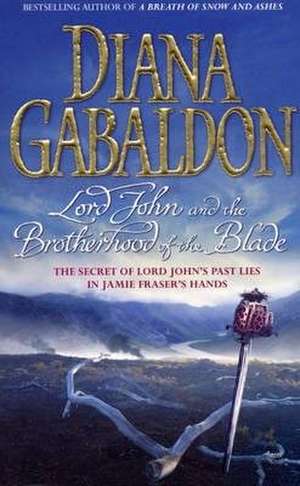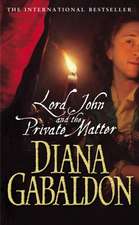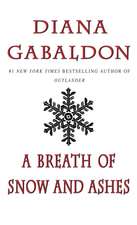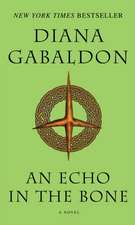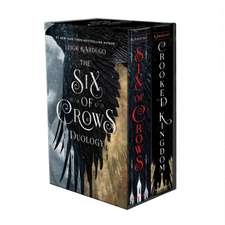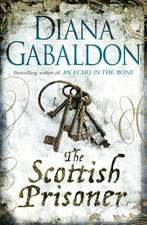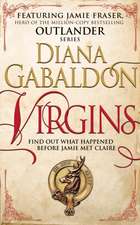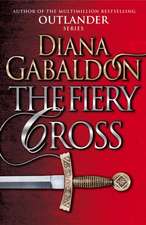Lord John and the Brotherhood of the Blade: Lord John Grey, cartea 3
Autor Diana Gabaldonen Limba Engleză Paperback – aug 2008
| Toate formatele și edițiile | Preț | Express |
|---|---|---|
| Paperback (2) | 60.61 lei 24-35 zile | +24.56 lei 4-10 zile |
| Random House – aug 2008 | 60.61 lei 24-35 zile | +24.56 lei 4-10 zile |
| DELTA – 31 iul 2008 | 109.31 lei 3-5 săpt. |
Preț: 60.61 lei
Preț vechi: 71.01 lei
-15% Nou
11.60€ • 12.59$ • 9.74£
Carte disponibilă
Livrare economică 04-15 aprilie
Livrare express 15-21 martie pentru 34.55 lei
Specificații
ISBN-10: 0099463334
Pagini: 640
Dimensiuni: 108 x 177 x 50 mm
Greutate: 0.34 kg
Editura: Random House
Colecția Arrow Books
Seria Lord John Grey
Locul publicării:United Kingdom
Recenzii
Descriere
The first book in Diana Gabaldon's LORD JOHN GREY series, set in the same world as her OUTLANDER novels.
It's 1758 and Europe is in turmoil - the Seven Years War is taking hold and London is ripe with deceit. The enigmatic Lord John Grey, a nobleman and high-ranking officer in His Majesty's Army, pursues a clandestine love affair and a deadly family secret. Grey's father, the Duke of Pardloe, shot himself just days before he was to be accused of being a Jacobite traitor.
Now, seventeen years on, the family name has been redeemed; but an impending marriage revives the scandal. Lord John knows that as Whitehall whispers, rumours all too often lead their victims to the wails of Newgate prison - and to the gallows. From barracks and parade-grounds to the bloody battlefields of Prussia, Grey faces danger and forbidden passions in his search for the truth.
But it is in the stony fells of the Lake District that he finds the man who may hold the key to his quest: the enigmatic Jacobite prisoner Jamie Fraser. Eighteenth-century Europe is brought startlingly to life in this compelling adventure mystery.
Notă biografică
She says that the Outlander series started by accident: 'I decided to write a novel for practice in order to learn what it took to write a novel, and to decide whether I really wanted to do it for real. I did - and here we all are trying to decide what to call books that nobody can describe, but that fortunately most people seem to enjoy.'
And enjoy them they do - in their millions, all over the world. Published in 42 countries and 38 languages, in 2014 the Outlander novels were made into an acclaimed TV series starring Sam Heughan as Jamie Fraser and Caitriona Balfe as Claire. The series has now been renewed for a fifth and sixth season.
Diana lives with her husband and dogs in Scottsdale, Arizona.
Extras
All in the Family
London, January 1758 The Society for Appreciation of the English Beefsteak, A Gentlemen’s Club
To the best of Lord John Grey’s knowledge, stepmothers as depicted in fiction tended to be venal, evil, cunning, homicidal, and occasionally cannibalistic. Stepfathers, by contrast, seemed negligible, if not completely innocuous.
“Squire Allworthy, do you think?” he said to his brother. “Or Claudius?”
Hal stood restlessly twirling the club’s terrestrial globe, looking elegant, urbane, and thoroughly indigestible. He left off performing this activity, and gave Grey a look of incomprehension.
“What?”
“Stepfathers,” Grey explained. “There seem remarkably few of them among the pages of novels, by contrast to the maternal variety. I merely wondered where Mother’s new acquisition might fall, along the spectrum of character.”
Hal’s nostrils flared. His own reading tended to be confined to Tacitus and the more detailed Greek and Roman
histories of military endeavor. The practice of reading novels he regarded as a form of moral weakness; forgivable, and in fact, quite understandable in their mother, who was, after all, a woman. That his younger brother should share in this vice was somewhat less acceptable.
However, he merely said, “Claudius? From Hamlet? Surely not, John, unless you happen to know something about Mother that I do not.”
Grey was reasonably sure that he knew a number of things about their mother that Hal did not, but this was neither the time nor place to mention them.
“Can you think of any other examples? Notable stepfathers of history, perhaps?”
Hal pursed his lips, frowning a bit in thought. Absently, he touched the watch pocket at his waist.
Grey touched his own watch pocket, where the gold and crystal of his chiming timepiece—the twin of Hal’s—made a reassuring weight.
“He’s not late yet.”
Hal gave him a sideways look, not a smile—Hal was not in a mood that would permit such an expression—but tinged with humor, nonetheless.
“He is at least a soldier.”
In Grey’s experience, membership in the brotherhood of the blade did not necessarily impute punctuality—their friend Harry Quarry was a colonel and habitually late—but he nodded equably. Hal was sufficiently on edge already. Grey didn’t want to start a foolish argument that might color the imminent meeting with their mother’s intended third husband.
“It could be worse, I suppose,” Hal said, returning to his moody examination of the globe. “At least he’s not a bloody merchant. Or a tradesman.” His voice dripped loathing at the thought.
In fact, General Sir George Stanley was a knight, granted that distinction by reason of service of arms, rather than birth. His family had dealt in trade, though in the reasonably respectable venues of banking and shipping. Benedicta Grey, however, was a duchess. Or had been.
So far reasonably calm in the face of his mother’s impending nuptials, Grey felt a sudden drop of the stomach, a visceral reaction to the realization that his mother would no longer be a Grey, but would become Lady Stanley—someone quite foreign. This was, of course, ridiculous. At the same time, he found himself suddenly in greater sympathy with Hal.
The watch in his pocket began to chime noon. Hal’s timepiece sounded no more than half a second later, and the brothers smiled at each other, hands on their pockets, suddenly united.
The watches were identical, gifts from their father upon the occasion of each son’s twelfth birthday. The duke had died the day after Grey’s twelfth birthday, endowing this small recognition of manhood with a particular poignancy. Grey drew breath to say something, but the sound of voices came from the corridor.
“There he is.” Hal lifted his head, evidently undecided whether to go out to meet Sir George or remain in the library to receive him.
“Saint Joseph,” Grey said suddenly. “There’s another notable stepfather.”
“Quite,” said his brother, with a sidelong glance. “And which of us are you suggesting . . . ?”
A shadow fell across the Turkey carpet, cast by the form of a bowing servant who stood in the doorway.
“Sir George Stanley, my lord. And party.”
General Sir George Stanley was a surprise. While Grey had consciously expected neither Claudius nor Saint Joseph, the reality was a trifle . . . rounder than anticipated.
His mother’s first husband had been tall and dashing, by report, while her second, his own father, had been possessed of the same slight stature, fairness, and tidy muscularity which he had bequeathed to both his sons. Sir George rather restored one’s faith in the law of averages, Grey thought, amused.
A bit taller than himself or Hal, and quite stout, the general had a face that was round, cheerful, and rosily guileless beneath a rather shabby wig. His features were nondescript in the extreme, bar a pair of wide brown eyes that gave him an air of pleasant expectation, as though he could think of nothing so delightful as a meeting with the person he addressed.
He bowed in greeting, but then shook hands firmly with both Greys, leaving Lord John with an impression of warmth and sincerity.
“It is kind of you to invite me to luncheon,” he said, smiling from one brother to the other. “I cannot say how greatly I appreciate your welcome. I feel most awkward, then, to begin at once with an apology—but I am afraid I have imposed upon you by bringing my stepson. He arrived unexpectedly this morning from the country, just as I was setting out. Seeing that you will in some sense be brothers . . . I, er, thought perhaps you would pardon my liberty in bringing him along to be introduced.” He laughed, a little awkwardly, and blushed; an odd mannerism in a man of his age and rank, but rather endearing, Grey thought, smiling back despite himself.
“Of course,” Hal said, managing to sound cordial.
“Most certainly,” Grey echoed. He was standing closest to Sir George, and now turned to the general’s companion, hand extended in greeting, and found himself face to face with a tall, slender, dark-eyed young man.
“My Lord Melton, Lord John,” the general was saying, a hand on the young man’s shoulder. “May I present Mr. Percival Wainwright?”
Hal was a trifle put out; Grey could feel the vibrations of annoyance from his direction—Hal hated surprises, particularly those of a social nature—but he himself had little attention to spare for his brother’s quirks at the moment.
“Your servant, sir,” he said, taking Mr. Wainwright’s hand, with an odd sense of previous meeting.
The other felt it, too; Grey could see the faint expression of puzzlement on the young man’s face, a faint inturning of fine dark brows, as though wondering where . . .
Realization struck them simultaneously. His hand tightened involuntarily on the other’s, just as Wainwright’s grip clutched his.
“Yours, sir,” murmured Wainwright, and stepped back with a slight cough. He reached to shake Hal’s hand, but glanced briefly back at Grey. His eyes were also brown, but not at all like his stepfather’s, Grey thought, the momentary shock of recognition fading.
They were a soft, vivid brown, like sherry sack, and most expressive. At the moment, they were dancing with mirth at the situation—and filled with the same intensely personal interest Grey had seen in them once before, at their first meeting . . . in the library of Lavender House.
Percy Wainwright had given him his name—and his hand—upon that occasion, too. But Grey had been an anonymous stranger then, and the encounter had been necessarily brief.
Hal was expressing polite welcome to the newcomer, though giving him the sort of coolly professional appraisal he would use to sum up an officer new to the regiment.
Grey thought Wainwright stood up well to such scrutiny; he was well-built, dressed neatly and with taste, clear-skinned and clean-featured, with an attitude that spoke of both humor and imagination. Both traits could be dangerous in an officer, but on a personal level . . .
Wainwright seemed to be discreetly exercising his own curiosity with regard to Grey, flicking brief glances his way—and little wonder. Grey smiled at him, now rather enjoying the surprise of this new “brother.”
“I thank you,” Wainwright said, as Hal concluded his welcome. He pulled his lingering attention away from Grey, and bowed to Hal. “Your Grace is most . . . gracious.”
There was an instant of stricken silence following that last, half-strangled word, spoken as Wainwright realized, a moment too late, what he had said.
Hal froze, for the briefest instant, before recovering himself and bowing in return.
“Not at all,” he said, with impeccable politeness. “Shall we dine, gentlemen?”
Hal turned at once for the door, not looking back. And just as well, Grey thought, seeing the hasty exchange of gestures and glances between the general and his stepson—horrified annoyance from the former, exemplified by rolling of the eyes and a brief clutching of the shabby wig; agonized apology by the latter—an apology extended wordlessly to Grey, as Percy Wainwright turned to him with a grimace.
Grey lifted one shoulder in dismissal. Hal was used to it—and it was his own fault, after all.
“We are fortunate in our timing,” he said, and smiled at Percy. He touched Wainwright’s back, lightly encouraging him toward the door. “It’s Thursday. The Beefsteak’s cook does an excellent ragout of beef on Thursdays. With oysters.”
Sir George was wise enough to make no apology for his stepson’s gaffe, instead engaging both the Greys in conversation regarding the campaigns of the previous autumn. Percy Wainwright appeared a trifle flustered, but quickly regained his composure, listening with every evidence of absorption.
“You were in Prussia?” he asked, hearing Grey’s mention of maneuvers near the Oder. “But surely the Forty-sixth has been stationed in France recently—or am I mistaken?”
From the Hardcover edition.
